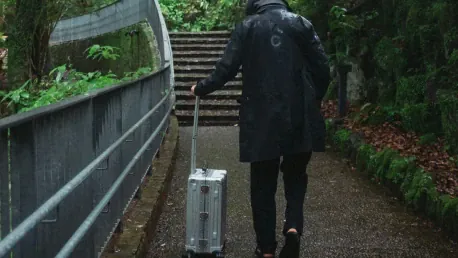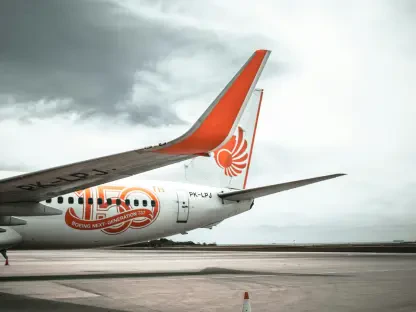The landscape of business travel is undergoing a significant transformation, driven by emerging workforce trends such as the gig economy, remote work, and the blending of business with leisure, known as bleisure. These trends are reshaping how companies approach travel, necessitating new policies and strategies to accommodate the evolving needs of their employees. By 2040, it is projected that 18% of the global workforce will engage in business travel, with potential growth to 22% if sustainable practices and technologies are fully integrated.
The Rise of Bleisure Travel
Bleisure Travel: A Growing Trend
Bleisure travel, which combines business and leisure, has seen a significant surge, especially in the post-pandemic era. This trend now comprises over 30% of the global business travel market. Business travelers are increasingly extending their trips to include leisure activities, often bringing their families along. This shift is prompting business-focused hotels to adapt by offering amenities that cater to both business and leisure needs, such as family-friendly services and recreational facilities. The convergence of working and leisure environments creates a richer experience that benefits employees by reducing travel fatigue and improving overall satisfaction.
The evolution of bleisure highlights the importance of integrating holistic travel experiences for employees, leading companies to think differently about travel policies. Factors such as weekend extensions, leisure side trips, and family accommodations have now taken a front seat, prompting hospitality sectors to innovate. Hotels geared toward business travelers have expanded their range of services to include fitness centers, wellness spas, and child-friendly facilities to attract bleisure travelers. This shift ensures that employees can balance their professional obligations while enjoying quality leisure time, promoting a healthier work-life synergy and enhancing productivity.
Implications for Companies
While bleisure travel offers numerous benefits, including improved employee satisfaction and work-life balance, it also presents challenges for companies. Organizations must address the implications of bleisure travel on duty of care, risk management, cost, and data tracking. Ensuring the safety and well-being of employees during both business and leisure parts of their trips is crucial, as these activities can pose different risks. Companies need to develop specific policies to govern bleisure travel, clearly outlining responsibilities and expectations, particularly in terms of insurance coverage and emergency protocols.
Managing travel expenses and accurately tracking travel data are also critical considerations. Bleisure trips introduce complexities in expense reporting and reimbursement processes that companies must navigate carefully to avoid discrepancies. Efficiently separating business and leisure expenses requires sophisticated tracking systems and transparent guidelines. Companies must also consider the impact of bleisure travel on their bottom line and evaluate the return on investment by measuring employee satisfaction and productivity gains. Incorporating flexible policies that cater to the modern workforce can ultimately drive business growth and innovation, reflecting a more adaptive corporate culture.
The Gig Economy’s Impact on Business Travel
Growth of the Gig Economy
The gig economy is another significant trend reshaping business travel. With the World Bank estimating up to 435 million global gig workers, this segment of the workforce includes freelancers, independent contractors, and short-term workers who require frequent travel for various projects and assignments. The increasing prevalence of gig work reflects a shift towards more flexible, project-based employment models that offer both opportunities and challenges for travel management. As companies utilize gig workers to enhance agility and access specialized skills, they must also consider how to effectively support their travel needs.
The nature of gig work often necessitates rapid and flexible travel arrangements. Unlike traditional employees, gig workers might have unpredictable schedules and unique requirements that call for customized travel solutions. This trend compels organizations to rethink travel policies, moving towards more adaptive, on-demand travel services. Companies might consider leveraging technology-driven platforms to manage gig worker travel, ensuring seamless bookings, real-time updates, and efficient communication channels. By doing so, they can maintain cost efficiency and ensure that gig workers are fully supported throughout their travel engagements.
Adapting Travel Policies
To effectively support gig workers, companies need to develop flexible travel policies that cater to short-term and freelance engagements. This includes providing options for short-term accommodations, transportation, and travel insurance tailored to the needs of gig workers. Policies must be designed to accommodate the dynamic nature of gig work, offering convenience and ensuring that workers can focus on their assignments without the burden of complex logistics. Providing clear guidelines on travel expectations and reimbursements can help manage costs and ensure compliance with corporate standards.
Moreover, companies must consider the financial implications of supporting gig workers’ travel needs and ensure that their policies are cost-effective and sustainable. Establishing partnerships with travel service providers and exploring volume discounts can help optimize spending. Additionally, offering gig workers access to corporate travel resources, such as booking platforms and emergency support, can streamline the travel process and enhance their overall experience. By fostering an inclusive approach to travel management, companies can attract and retain talented gig workers, ultimately driving innovation and business success.
Remote Work and Its Influence on Business Travel
The Shift to Remote Work
Remote work is expected to become the norm by 2040, significantly impacting business travel. While remote work reduces the need for travel for routine engagements, it increases the demand for flexible, short-term accommodations and co-working spaces. As more employees work remotely, there is a growing need for travel arrangements that support temporary relocations for specific projects, team meetings, and client interactions. The shift towards remote work also highlights the importance of creating environments that foster collaboration and connectivity, even when employees are not physically present in the same location.
To adapt to this new paradigm, companies need to rethink their travel policies and explore innovative solutions that balance virtual and in-person interactions. This might include offering travel stipends, flexible workspaces, and access to co-working facilities that promote productivity and creativity. Emphasizing the value of face-to-face meetings for building relationships and driving innovation, companies can create a travel culture that enhances remote work experiences and maintains strong team dynamics. Developing robust remote work policies that align with travel management strategies can support employee well-being and ensure seamless operations.
Balancing Virtual and In-Person Collaboration
As virtual meetings become more commonplace, fostering in-person collaboration remains essential for employee engagement and productivity. Companies must strike a balance between virtual and in-person interactions, recognizing the value of face-to-face meetings for building relationships and driving innovation. This shift will likely lead to increased travel for small, creative meetings and team-building activities, requiring companies to adapt their travel policies accordingly. By integrating both virtual and physical elements, organizations can create a cohesive work environment that leverages the best of both worlds.
The hybrid model of work and travel necessitates strategic planning to optimize outcomes and manage costs. Companies might organize periodic in-person gatherings, such as off-site retreats and workshops, to facilitate deep collaboration and foster a sense of community among remote workers. Incorporating travel incentives and rewards programs can also motivate employees to participate in essential meetings and events. Additionally, investing in advanced technologies that support virtual collaboration, such as VR and AR tools, can enhance remote work experiences and bridge the gap between physical and digital interactions. By embracing a holistic approach to work and travel, companies can drive innovation, engagement, and growth.
Sustainable Practices and Technologies
Integrating Sustainability
Sustainability is becoming a critical consideration in business travel, with companies increasingly adopting eco-friendly practices and technologies. By integrating sustainable practices, organizations can reduce their environmental impact and appeal to environmentally conscious employees. This includes choosing eco-friendly accommodations, utilizing sustainable transportation options, and implementing policies that encourage responsible travel behavior. Emphasizing sustainability can also enhance a company’s reputation, positioning it as a leader in corporate social responsibility and attracting top talent.
To achieve sustainability goals, companies must develop comprehensive travel policies that prioritize green practices. This might involve selecting hotels with strong sustainability credentials, encouraging the use of public transportation and electric vehicles, and minimizing air travel by maximizing the efficiency of business trips. Additionally, organizations can implement carbon offset programs and support environmental initiatives that align with their values. By fostering a culture of sustainability, companies can contribute to global efforts to combat climate change and create a positive impact on the environment.
Leveraging Technology
Advancements in technology are also playing a significant role in transforming business travel. Companies are leveraging digital tools and platforms to streamline travel planning, enhance traveler safety, and improve overall efficiency. From virtual reality meetings to AI-powered travel management systems, technology is enabling more sustainable and effective business travel solutions. These innovations provide real-time data and analytics, helping companies monitor travel patterns, optimize routes, and reduce costs. By embracing technology, organizations can enhance the travel experience for employees while achieving sustainability objectives.
Technology can also facilitate better communication and coordination, ensuring that travelers have access to vital information and support when needed. Mobile apps, for example, can provide instant updates on travel arrangements, access to emergency assistance, and seamless expense reporting. Additionally, the use of blockchain technology can enhance transparency and security in travel transactions, reducing the risk of fraud and ensuring data integrity. As companies continue to innovate and integrate technology into their travel policies, they can create a more efficient, sustainable, and user-friendly travel ecosystem that meets the evolving needs of their workforce.
Adapting to Future Workforce Trends
Flexibility and Adaptability
To navigate the evolving landscape of business travel, companies must prioritize flexibility and adaptability in their travel policies. This includes accommodating the diverse needs of a multi-generational workforce, supporting various work arrangements, and staying abreast of emerging trends. By fostering a culture of flexibility, organizations can better support their employees and ensure a positive travel experience. This approach requires a proactive stance, anticipating changes in workforce dynamics and continuously refining travel strategies to align with shifting expectations.
Flexibility in travel policies also involves empowering employees to make decisions that best suit their individual circumstances and professional requirements. Allowing for personalized travel arrangements, such as choosing preferred travel dates or selecting specific accommodation types, can enhance employee satisfaction and productivity. Additionally, companies should consider implementing flexible budgeting and reimbursement structures that accommodate a wide range of travel scenarios. By adopting a responsive and adaptive mindset, organizations can create a travel culture that promotes innovation, collaboration, and employee well-being.
Strategic Planning
The business travel landscape is experiencing a major shift, driven by workforce trends like the gig economy, remote work, and the blending of business with leisure, or bleisure. These evolving trends are transforming corporate travel strategies, prompting companies to create new policies that meet the changing needs of their employees. By 2040, it is expected that 18% of the global workforce will engage in business travel, and this number could rise to 22% if sustainable practices and advanced technologies are fully adopted. The gig economy has introduced a more flexible workforce, and remote work has become more widespread, both of which influence how business trips are planned and executed. Moreover, the concept of bleisure, where employees combine work trips with leisure activities, has added another layer of complexity to corporate travel planning. To remain competitive and retain talent, companies must adapt to these trends by developing innovative travel policies that emphasize flexibility, sustainability, and employee well-being.









